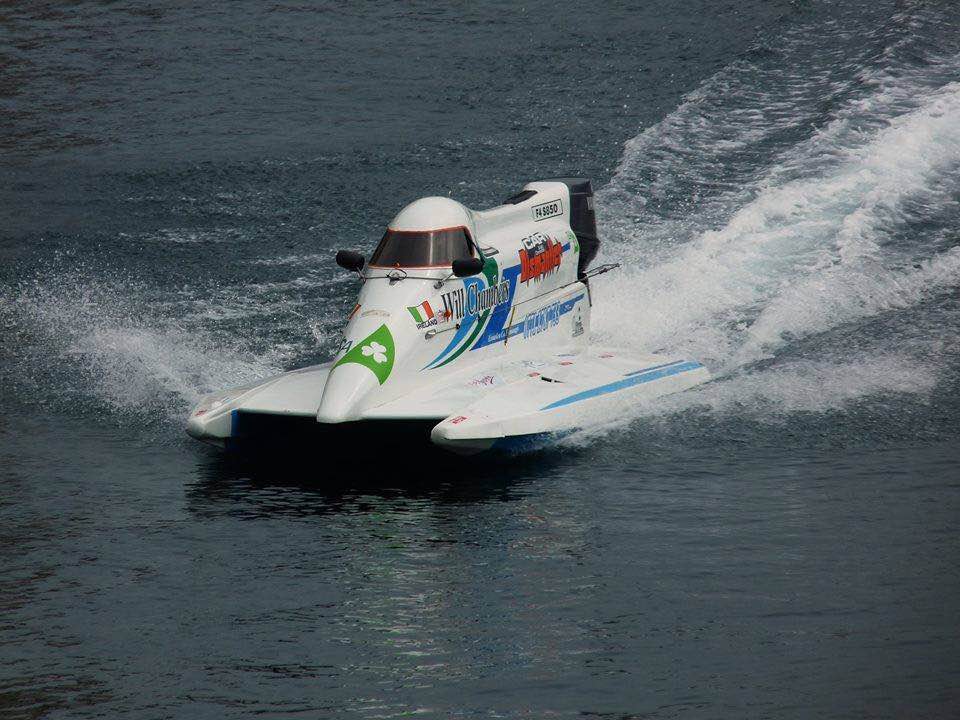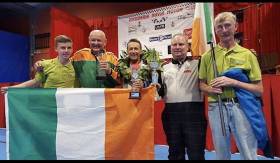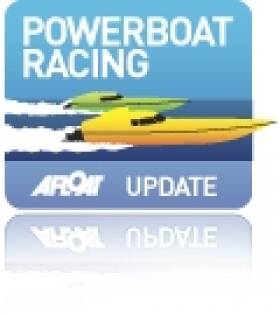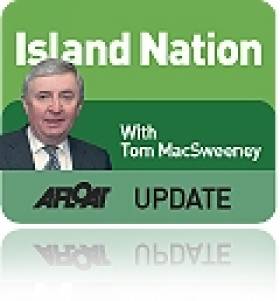Displaying items by tag: Denis Dillon
Last weekend in Navia, Asturias, Spain, Hr850 and T850 Powerboat racing teams competed and represented their countries at the highest international level, the UIM World Championships. Within this group was Team Powerboat Ireland, a group of Irish Powerboat enthusiasts made up from members of North East Powerboat and Racing Club and the Irish Powerboat Racing Club.
Will Chambers (Hr850 Driver), Oliver Haire (T850 Driver) Denis Dillon (T850 Driver) Simon Haire (Crew) Dick Corley (Mechanic) veterans of previous UIM European Championships decided to pool their talents under the Banner of “Team Powerboat Ireland” and with the support of the ISA as the UIM National Authority, travel to the World Championships, represent their country and hopefully bring back UIM World Championship medals to Ireland.

The competition would not be easy as the Team found out on day 1. Will Chambers following on from his success at Navia the previous year with a UIM Silver in the European Championships was determined to follow up with a World Championship podium place. Competitive from the start he was up at the front when his race boat was holed and he had to abandon the race and lift his boat to safety. Oliver Haire also had the mechanical gremlins strike and was also lifted to safety. With no points on the score sheet for both Will and Oliver, Day 2 seemed a long way away and decisions had to be made as to what the Team would do. A Team meeting was held and a decision was made to work some long hours and repair the holed HR850 and replace the engine powerhead in the T850.
When Day two dawned, Team Powerboat Ireland were ready and with Denis Dillon having the only points on the scoresheet they knew it would be a challenge that would see man and machines pushed to the limit. And to the limit they were pushed with Will Chambers working his way up the standings with two fine second place finishes in the final heats which saw him take 3rd place overall in the HR850 Class and a UIM World Championship Bronze Medal.
There was to be no podium places for Denis Dillon and Oliver Haire but both finished in the rankings and were presented with their trophies. All were delighted that they had represented their country as best as they could and they knew they had competed against the best in the world. Plans are already afoot as to how to gain the extra edge that will see them advance in the standings for 2017.
A statement from the Team shortly after the final results:
“It’s being an amazing two days of racing, we have put blood sweat and tears into every practice, every qualifying, every race heat and we followed this up with a long evening maintaining both man and machine. During the event, we never let our passion determination and teamwork falter and for Will Chambers to achieve a UIM World Championship Bronze Medal It made the trip all worthwhile.
We knew when we left Ireland for the long journey to Spain that we would be competing against the best competitors in the world, this did not deter us and it just goes to show what a few guys with determination and Teamwork can achieve. We are very proud to have represented IRELAND on the World Stage and to bring back a “UIM World Championship Medal” in the HR850 Class is an honor and a privilege for all of us. The Team believes we have shown like our P750 racers before us what can be achieved, we feel with the right support & sponsorship, Irish Powerboat Racing Teams & Clubs working together can ensure that Team Ireland competes in UIM European & World Championships into the future, in regard to our UIM Medals we hope they are many more to come.”
Powerboat Racing's 'America's Cup' Returns to Cork
Plans are afoot to bring powerboat racing's Harmsworth Trophy event to Cork in 2014 - over 100 years since Cork Harbour hosted the first ever edition of the race. SCROLL DOWN FOR ARCHIVE Footage.
Regarded as the powerboat version of yachting's America's Cup, the first Harmsworth Trophy was won in July 1903 by Napier, which was allegedly piloted by women's world land speed record holder Dorothy Lewitt.
According to the Tom MacSweeney column in the Evening Echo, a consortium is hard at work to bring the race back to its birthplace - coinciding with the Round Ireland Powerboat Race, which will also be held out of Cork in 2014.
Denis Dillon of the Irish Sailing Association commented: "There is a group of Cork enthusiasts interested and is trying to put a consortium together that would also bring back one of the original 1903 boats still is existance which is in the USA.
"It came first in its class and second overall in the race in 1903 and they hope to bring it back for the 2014 race."
Sailing Body Challenges Government
The Irish Sailing Association has told the Government that Ireland is being left behind in marine development because of the way the State has neglected the maritime sphere. I applaud the national sailing authority for making it clear that while other countries are capitalising on their natural marine assets in coastal and inland waterways, Ireland is being left behind at a significant cost to the State in lost revenue and employment opportunities.
Irish sailors have raised the profile of the sport worldwide, the Volvo Race in Galway brought international attention to Irish sailing, but the Government has failed to capitalise on this sporting success. The ISA has offered a three-year development strategy to the Department of Transport, one of five Government Departments with marine responsibility.
"As we see a decline in some of the traditional marine-related industries," says the ISA, "there is an opportunity to develop the maritime recreational sphere, to grow and attract employment opportunities in rural areas that are struggling and bring significant national and international revenue if there is greater investment in marine leisure infrastructure."
Having been advised to do so at its national conference earlier this year, the national sailing authority has also reviewed its own operational structures. From next month it will put more emphasis on providing regional support for clubs and training centres, as well as improving communications with the membership.
Two Regional Development Officers have been appointed. Denis Dillon who has been Motorboat Development Officer is taking up the role of Regional Development Officer for the Southern Region. He will work with clubs, training centres, local authorities and local sports partnerships to increase interest in sailing. Ciaran Murphy is joining the ISA as his counterpart for the Northern Region which will include Dublin. Pamela Smithwick, who has been the ISA's "Women on the Water Development Officer," is taking responsibility for club membership and liaison. Rachel Solon, the Association's Training Administrator, has been assigned the role of Communications Officer.
Harry Hermon, ISA Chief Executive, anticipates the changes will "raise the profile of the sport, resulting in a significant increase in people participating in club and training centre activity. Our aim is to increase interest amongst the wider boating community and the general public."
The Association's strategy document tells the Department that more boating usage by the public should not be restricted by unnecessary regulations, which should only be imposed where "necessary, appropriate and enforceable."
While safety must always be uppermost in sailing, there does come a time when people must take responsibility to look after themselves. The Department has not helped the sport by regulation of short-handed, single-handed sailing in Irish waters, unique in world sailing and imposed without reasonable consultation.
It is good to see the ISA standing up for the sport and its document points to what I believe is a core problem ... "As there is no longer a Department of the Marine, we have in recent years seen marine leisure interests fragmented across different Government Departments which include, Transport, Sport and Tourism, Environment, Agriculture and Fisheries and Education. The result is that there is little or no co-ordinated strategy to promote or develop the sector.
"As an island nation we have undoubtedly some of the best coastline and waterways in the world. Where other countries are capitalising on their natural assets, Ireland is being left behind at a significant cost to the State in lost revenue and employment opportunities."
A greater political awareness of the potential of sailing as a significant contributor to the economic is needed. The ISA says this requires education and awareness programmes to raise interest.
These are good proposals but Departmental bureaucrats sitting on their fat salaries, behind desks which have never felt the roll of the sea, will not like being challenged, so they may ignore the ISA.
The full ISA submission is below as a downloadable PDF.
• This article is reprinted by permission of the CORK EVENING ECHO in which Tom MacSweeney writes maritime columns twice weekly. Evening Echo website: www.eecho.ie































































